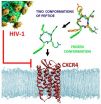(Press-News.org) HIGH LEVELS of iron could raise the risk of bowel cancer by switching on a key pathway in people with faults in a critical anti-cancer gene, according to a study published in Cell Reports* today (Thursday).
Cancer Research UK scientists, based at the University of Birmingham and the Beatson Institute for Cancer Research in Glasgow, found bowel cancers were two to three times more likely to develop in mice with a faulty APC gene that were fed high amounts of iron compared to mice who still had a working APC gene.
In contrast, mice with a faulty APC gene fed a diet low in iron did not develop bowel cancer at all.
Study author Professor Owen Sansom, deputy director of the Cancer Research UK Beatson Institute for Cancer Research in Glasgow, said: "We've made a huge step in understanding how bowel cancer develops. The APC gene is faulty in around eight out of 10 bowel cancers but until now we haven't known how this causes the disease.
"It's clear that iron is playing a critical role in controlling the development of bowel cancer in people with a faulty APC gene. And, intriguingly, our study shows that even very high levels of iron in the diet don't cause cancer by itself, but rely on the APC gene."
Co-author Dr Chris Tselepis, a Cancer Research UK scientist at the University of Birmingham, said: "Our results also suggest that iron could be raising the risk of bowel cancer by increasing the number of cells in the bowel with APC faults. The more of these cells in the bowel, the greater the chance that one of these will become a starting point for cancer.
"We're now planning to develop treatments that reduce the amount of iron in the bowel and so could lower the risk of developing bowel cancer. We hope to start using these in trials in the next few years in people who are at a greater risk."
The study could also explain why foods such as red meat, which have high levels of iron, are linked to an increased risk of bowel cancer.
When the APC gene is deleted, two proteins are switched on that cause iron to build up in bowel cells. When this happens, a key cancer signalling pathway called wnt is switched on, causing cells to grow out of control.
In mice fed a diet with no iron, cells with a faulty APC gene were killed and bowel cancers did not develop.
Mice with a fully functioning APC gene did not develop bowel cancers, even when fed a diet high in iron. In these bowel cells, the iron accumulation proteins are turned off and wnt signalling remains inactive.
Dr Julie Sharp, senior science information manager at Cancer Research UK, said: "Bowel cancer is the third most common cancer in the UK. These findings suggest a potentially effective way of reducing the chances of bowel cancer developing in people who are at high risk. Finding ways of 'mopping up' the iron that is in the bowel could have a real impact on the number of people who develop the disease.
"This research is a great example of scientists coming together and sharing their different expertise to find new ways of understanding and potentially preventing cancer."
###
For media enquiries please contact Simon Shears in the Cancer Research UK press office on 020 3469 8054 or, out-of-hours, the duty press officer on 07050 264 059.
Notes to editors:
*Radulescu, S et al. Luminal iron levels govern intestinal tumourigenesis following Apc loss in vivo Cell Reports (2012)
The University of Birmingham
The University of Birmingham is a truly vibrant, global community and an internationally-renowned institution. Ranked amongst the world's top 100 institutions, its work brings people from across the world to Birmingham, including researchers and teachers and more than 4,000 international students from nearly 150 countries.
The University is home to nearly 30,000 students. With more than 7,500 postgraduate students from across the world, Birmingham is one of the most popular universities for postgraduate study in the UK.
The University plays an integral role in the economic, social and cultural growth of local and regional communities; working closely with businesses and organisations, employing approximately 6,000 staff and providing 10,000 graduates annually.
About the Beatson Institute for Cancer Research
The Beatson Institute for Cancer Research is core-funded by Cancer Research UK and provides a dynamic, supportive and well-resourced environment for its basic and translational scientists. Its mission is to:
Understand how cancer cells grow, survive and spread
Identify critical components of these pathways as targets for novel cancer treatments
Help translate this knowledge for the benefit of cancer patients
At the beginning of 2008 the Beatson Institute moved into a new state-of-the –art building – further information can be found at www.beatson.gla.ac.uk
About Cancer Research UK
Cancer Research UK is the world's leading cancer charity dedicated to saving lives through research
The charity's groundbreaking work into the prevention, diagnosis and treatment of cancer has helped save millions of lives. This work is funded entirely by the public.
Cancer Research UK has been at the heart of the progress that has already seen survival rates in the UK double in the last forty years.
Cancer Research UK supports research into all aspects of cancer through the work of over 4,000 scientists, doctors and nurses.
Together with its partners and supporters, Cancer Research UK's vision is to beat cancer.
For further information about Cancer Research UK's work or to find out how to support the charity, please call 0300 123 1861 or visit www.cancerresearchuk.org. Follow us on Twitter and Facebook
Scientists discover how iron levels and a faulty gene cause bowel cancer
2012-08-09
ELSE PRESS RELEASES FROM THIS DATE:
Urban poor plagued by 'burdens of place'
2012-08-09
EAST LANSING, Mich. — Most of America's urban cores were designed for walking but offer little in the way of supermarkets, healthy restaurants and other amenities for residents to walk to, according to a study led by a Michigan State University scholar.
The study is one of the first to show that poor residents living in declining urban neighborhoods want healthy food choices – evidenced by their willingness to travel long distances to find them. Past research has generally assumed that poor people will shop at whatever store is closest.
But compared with suburban residents, ...
Plenty of dark matter near the Sun
2012-08-09
Dark matter was first proposed by the Swiss astronomer Fritz Zwicky in the 1930s. He found that clusters of galaxies were filled with a mysterious dark matter that kept them from flying apart. At nearly the same time, Jan Oort in the Netherlands discovered that the density of matter near the Sun was nearly twice what could be explained by the presence of stars and gas alone. In the intervening decades, astronomers developed a theory of dark matter and structure formation that explains the properties of clusters and galaxies in the Universe, but the amount of dark matter ...
Looking to Lose Weight?
2012-08-09
SHREWSBURY, MA – A new study published in Nutrition Journal shows that people can lose weight while consuming typical amounts of sugar or high fructose corn syrup (HFCS) if their overall caloric intake is reduced.
"Our research debunks the vilification of high fructose corn syrup in the diet," said James M. Rippe, M.D., one of the study authors. "The results show that equally reduced-calorie diets caused similar weight loss regardless of the type or amount of added sugars. This lends further support to findings by our research group and others that table sugar and HFCS ...
89 million people medically uninsured during 2004 to 2007
2012-08-09
Eighty-nine million Americans were without health insurance for at least one month during the period from 2004 to 2007, and 23 million lost coverage more than once during that time, according to researchers at Penn State and Harvard University.
"These findings call attention to the continuing instability and insecurity of health insurance in our country," said Pamela Farley Short, professor of health policy and administration, Penn State. "With more than a third of all Americans under age 65 being uninsured at some point in a four-year period, it's easy to see that the ...
He/she, him/her – a sign of women's place in society?
2012-08-09
Language use in books mirrors trends in gender equality over the generations in the US, according to a new study by Jean Twenge, from San Diego State University, and colleagues. Their work explores how the language in the full text of more than one million books reflects cultural change in U.S. women's status. The study is published online in Springer's journal Sex Roles.
Twenge and colleagues, W. Keith Campbell and Brittany Gentile of the University of Georgia, examined whether the use of gendered pronouns such as 'he' and 'she' mirrored women's status between 1900-2008, ...
Retirement expert: Medicare woes mostly rooted in myth
2012-08-09
CHAMPAIGN, Ill. — Various misconceptions surrounding the continued viability of Medicare can be debunked or discredited, making it more important than ever for voters and policymakers to fully understand the program's existing contours and limitations, according to a paper published by a University of Illinois expert on retirement benefits.
Law professor Richard L. Kaplan says Medicare has become one of the most controversial federal programs for numerous reasons, but misinformation has played a key role in fostering criticism of it.
"Medicare is an important and complicated ...
Banks' cash stash: No shield against bankruptcy
2012-08-09
According to theoretical physicists João da Cruz and Pedro Lind from Lisbon University, Portugal, imposing minimum capital levels for banks may not prevent the insolvency of a minority of banks from triggering a widespread banking system collapse. In a study recently published in EPJ B1, the researchers explain why this measure could instead lead to larger crises.
The authors created a model of banks' behaviour to assess the conditions needed to avoid "avalanches" of insolvent banks. Their model is based on a physical system of particles representing how banks are attracted ...
Poorly-performing hand implants unacceptable says leading medical journal
2012-08-09
Los Angeles, CA (August 09, 2012) Poorly-performing medical implants have hit the headlines recently, and the trend looks set to continue: the September issue of the Journal of Hand Surgery (JHS) homes in on the unacceptable performance of hand implants for osteoarthritis patients. Citing several recent studies, the editorial asks why these implants – which perform worse that certain hip replacement implants now deemed unacceptable – are still widely used. JHS is an online and print, orthopedic surgery journal published by SAGE.
The issue reports on a number of thumb ...
Eating grapes may help protect heart health in men with metabolic syndrome, new study suggests
2012-08-09
Fresno, Calif. – Consuming grapes may help protect heart health in people with metabolic syndrome, according to new research published in the Journal of Nutrition. Researchers observed a reduction in key risk factors for heart disease in men with metabolic syndrome: reduced blood pressure, improved blood flow and reduced inflammation. Natural components found in grapes, known as polyphenols, are thought to be responsible for these beneficial effects.
The randomized, placebo-controlled, crossover study, led by principal investigator Dr. Maria Luz Fernandez and Jacqueline ...
Potential drug molecule shows enhanced anti-HIV activity
2012-08-09
Researchers from Munich and Naples have shown that minimal modification of a synthetic peptide with anti-HIV activity results in a new compound with more than two orders of magnitude higher binding affinity to the chemokine receptor CXCR4 and greatly improved anti-HIV activity. This could be a step toward the design of new, more effective drugs against AIDS, inflammatory diseases, and some forms of cancer.
Different strains of HIV-1 use either the chemokine receptor CCR5 or CXCR4 for entry into immune cells. While drugs that block usage of CCR5 by the virus are already ...



